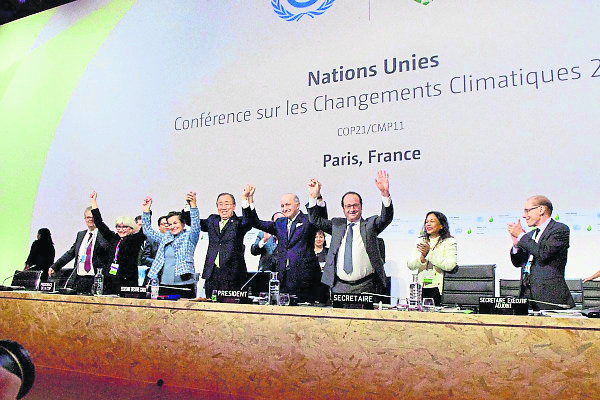
(Photo: Creative Commons)
“On 5 October 2016, the threshold for entry into force of the Paris Agreement was achieved. The Paris Agreement will enter into force on 4 November 2016.” This statement from the United Nations Framework Convention on Climate Change (UNFCCC) symbolises a momentous achievement over five years in the making. 77 parties making up 60% of global greenhouse gas emissions have now ratified the agreement (55 countries making up 55% of GHG emissions was the threshold); 190 states plus the EU have signed on, leaving 114 that make up the remaining 40% yet to ratify.
On October 4, UN Secretary-General, Ban Ki-moon, urged the European Parliament to approve a speedy ratification process in Strasbourg, France. Only days earlier, on October 2, India ratified, following the US and China in their powerful message to the world that even the largest emitters were ready to get serious about tackling climate change. Combined, the US, China, and India account for just over 42% of global GHG emissions. The nations who ratified on October 5 included: Malta, France, Germany, Canada, Bolivia, Austria, Hungary, Nepal, and Slovakia. The European Union also ratified that day, but each of the 28 member nations is to doing so independently as well. Rwanda ratified the following day and Poland on October 7.
One surprising fact for the Secretary-General is that even after all of his campaigning for nations to ratify the agreement and bring it into force, his home country of South Korea has still not chosen to do so. Even North Korea, a failed state isolated from the world, has ratified the treaty, and South Korea is one of the few nations left that accounts for over one percent of global emissions (1.85% to be exact). Some of the others include: Russia (7.53%), South Africa (1.46%), Australia (1.46%), and Japan (3.79%). Some of these countries have displayed commitments in their own rights to low carbon economies.
Japan is well known for its commitment to clean technologies, especially after the Fukushima Daiichi nuclear reactor failure, and subsequent closures of nuclear power plants across the country. Still, these five large emitters have failed ratify the treaty.
Renewable energy is at the forefront of the Paris Climate Agreement. It has been discussed over the years in many negotiations that coal fired power plants will have to be a thing of the past if the lofty goals in the agreement are to be fulfilled. Keeping the planet below the 2C mark will not be possible without major investment in renewable energy and reassessment of current power infrastructures; the goals effectively rule out new coal, oil, or gas projects if countries are to stay on track.
Though Paris brings forethought to questions of energy production, many nations would not hit peak emissions until some years after the agreement comes into force. Each signatory had to submit its INDC, or Intended Nationally Determined Contributions, to the UN before COP21 last December. China projected a 60-65% reduction of GHG emissions per unit of GDP by 2030; the US targeted 26-28% reduction by 2025; and India, on the condition of financial assistance from developed nations, submitted 33-35% reduction per unit of GDP by 2030 from 2005 levels.
On November 4, the treaty will become international law, but it will only bind those 76 states plus the EU who have ratified it. It may finally be time to rejoice in the display of unity between so many nations in the commitment to address and tackle climate change. Each day, more and more people are affected by this phenomenon, as it has no regard for borders or politics. Each season brings with it new surprises, new norms that may be ever more disastrous.
Hurricane Matthew was the first Category 4 hurricane to make landfall in Haiti in 52 years, and killed over 800 people there. There is no way to calculate climate change’s direct impact on the strength of natural disasters, but general trends point toward high impact if warming continues. If we do not take care of our planet, she cannot take care of us. The commitment to stay below a 1.5C increase in global temperatures is the right idea for ensuring a liveable planet for future generations, and we can finally applaud the nations who ratified for following through.
Sarah Sakeena Marshall, B.S. Environmental Policy